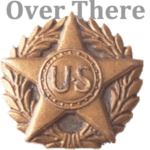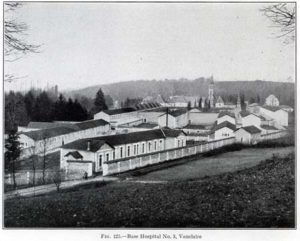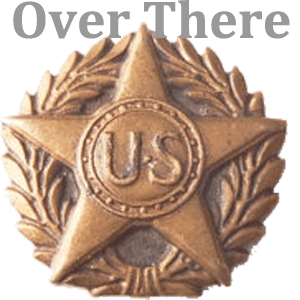 A series profiling American Jewish service in the First World War
A series profiling American Jewish service in the First World War
Private Harold Epstein
Wounded in Grimpette Woods
Harold Epstein left Sheffield, Pennsylvania for the Army on February 25, 1918. Epstein was the son of a Russian-immigrant father, one of eight children. He’d graduated from Sheffield High School five years earlier and worked as a field manager in the oil industry since graduation.
Epstein left for Europe aboard the Corsican on May 3rd. He served overseas with the 110th Infantry, 28th Division for what he called “10 long months.” It wasn’t long before his first experience in combat. He described it in a letter to his uncle written several months later and published in the Y.M.H.A. bulletin:
Everything was nice and quiet one night, when the bugle sounded the call to arms. We hurriedly rolled packs, loaded our muskets, stuck our bayonets on, and ho! for the Huns. We marched a couple of kilometres, when—whizz! bang! a German 77 opened up. Holy smoke! I felt my skin tightening on my face, my hair rising and my body turning cold; but we soon got the order to form a skirmish line. We did this and soon we were in the thick of it. But still I was a little shaky. We advanced gradually, when all of a sudden whizz! bang! zip! flew the shrapnel in all directions. A chunk tore through the pack on my back. It sort o’ got personal then. Before, it was something of a dream; now, holy red, roaring crippie! I was mad and, doggone it, I just sort of saw red. Well, we sort of cleaned them out of the wood and then we dug in. That was the beginning of the war for me.
That was the beginning of the war for Epstein, but the night of July 28th would be the wartime experience to affect him most deeply. The 28th Division was in combat with the Prussian 4th Division attempting to take the area around Ronchères, France. The area was strongly held by Germans with heavy armaments. Epstein and the men of Company G were part of an attempt to capture a German machine gun nest in the Grimpette Woods:
About half way up the hill we were met with a hail of machine-gun bullets, so flat we fell to the earth—so flat that my nose was penetrating the sod. Gradually we wormed our way forward, when a barrage opened up that shook the whole country. ‘Twas a German barrage and the shells were bursting all around us. If ever a man said his prayers it was I who said mine then. All of a sudden a few Jewish words entered my head: “Shema Yisrael Adonoi Elohanu Adonoi Eh Hod Boruch,” etc. A few minutes after saying these words a shell lit about five feet away from the three of us. Two fellows, one on each side, were instantly killed and I was blown into the air. After a while I regained some sense and thought, “What the heck is the use of dying?” So I looked at my comrades, shook them a little, but they were both dead.
The 110th was successful in their assaults on Grimpette Woods. By July 30th, the area was captured.

Epstein was wounded in multiple places but thankful that he survived unlike the men to each side of him. His hip was shot off, there was shrapnel in his chest and bullets in his shoulder blade and chest. He was first treated at Field Hospital #26 and then sent to Base Hospital #3. Epstein’s left side was paralyzed for 3 months and he was left with a limp. He described himself as “shell shocked for a time.”
He would finish his recovery back home months later. Epstein left Europe on December 8th and received more medical treatment at hospitals in the U.S. He left the service on February 26, 1919 and returned to Sheffield.
